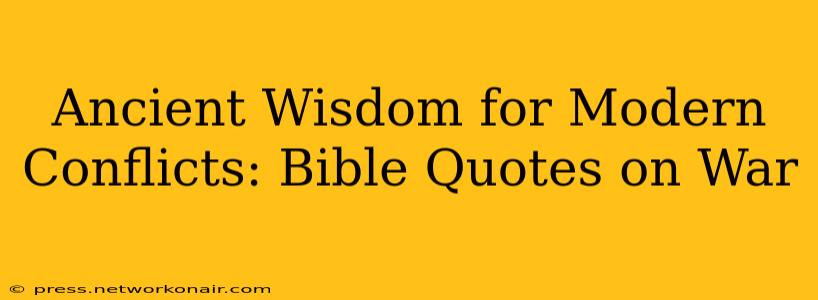The Bible, a collection of texts spanning centuries, offers a complex and multifaceted perspective on war. While it contains accounts of numerous battles and military campaigns, it also provides profound ethical and spiritual reflections on violence, peacemaking, and the human condition. Understanding these passages can offer valuable insights into navigating the complexities of modern conflict. This exploration delves into key biblical passages related to war, examining their historical context and contemporary relevance. We'll also address frequently asked questions surrounding the Bible's stance on warfare.
What Does the Bible Say About the Causes of War?
The Bible doesn't offer a single, simple explanation for the causes of war. Instead, it points to a variety of factors, often intertwined and reflecting the human condition's flaws. Pride, greed, ambition, and the lust for power are recurring themes. The book of Proverbs, for example, warns against the dangers of uncontrolled anger and the destructive consequences of unchecked ambition. The Old Testament chronicles numerous conflicts stemming from disputes over land, resources, and tribal rivalries. These conflicts highlight the destructive nature of unchecked human desires and the fragility of peace in the absence of justice and righteousness. Ultimately, the Bible suggests that the root cause of war lies in the human heart—in our capacity for selfishness, hatred, and violence.
How Does the Bible View Just War?
The concept of "Just War" theory, which attempts to define conditions under which war might be morally justifiable, finds some resonance within certain biblical interpretations. However, the Bible doesn't explicitly lay out a systematic framework like that developed by later theologians. The Old Testament describes instances where God commands or sanctions warfare, often to deliver his people from oppression or to punish wickedness. These instances, however, are often viewed within a specific theocratic context, not as a general endorsement of military action. The New Testament, particularly the teachings of Jesus, emphasizes love, forgiveness, and non-violence, raising significant questions about the compatibility of armed conflict with Christian ethics. Therefore, while certain interpretations might justify war under specific, narrowly defined circumstances, the overall biblical message leans toward peacemaking and reconciliation.
What are Some Key Bible Verses About Peace?
Numerous verses throughout the Bible emphasize the importance of peace. Isaiah 9:6 speaks of a prince of peace, a messianic figure whose reign would be marked by justice and tranquility. Matthew 5:9 contains the well-known Beatitude: "Blessed are the peacemakers, for they will be called children of God." These verses, along with numerous others, highlight the divine preference for peace and the blessings bestowed upon those who actively pursue it. The Bible's emphasis on peace isn't passive; it's a proactive call to action, urging believers to be agents of reconciliation and to work towards justice and harmony in the world.
Does the Bible Condemn All Forms of Violence?
While the Bible clearly condemns violence in many contexts, it's inaccurate to suggest a blanket condemnation of all forms of violence. The Old Testament recounts instances of sanctioned violence, often in the context of self-defense, righteous retribution, or fulfilling divine commands. However, the New Testament, particularly the teachings of Jesus, shifts the emphasis towards non-violent resistance and forgiveness. The concept of turning the other cheek (Matthew 5:39) is frequently cited as an example of this radical approach. The distinction lies in the intention and motivation behind the use of force. Violence as an act of aggression or fueled by hatred is consistently condemned, while violence used defensively or in the context of upholding justice can be viewed differently, depending on the interpretation.
How Can Biblical Wisdom Help Us Address Modern Conflicts?
The Bible's wisdom on conflict transcends its historical context. Its teachings on forgiveness, reconciliation, justice, and love provide valuable tools for navigating the complexities of modern conflicts. The emphasis on understanding the root causes of conflict, prioritizing peaceful resolution, and striving for justice can guide our approach to contemporary challenges. By embracing the principles of compassion, empathy, and non-violent resistance, we can work toward creating a more just and peaceful world, drawing upon the enduring wisdom contained within the scriptures. The challenge lies in applying these ancient principles to the unique circumstances of our time, thoughtfully considering the ethical implications of our actions and striving for solutions that promote lasting peace and harmony.

